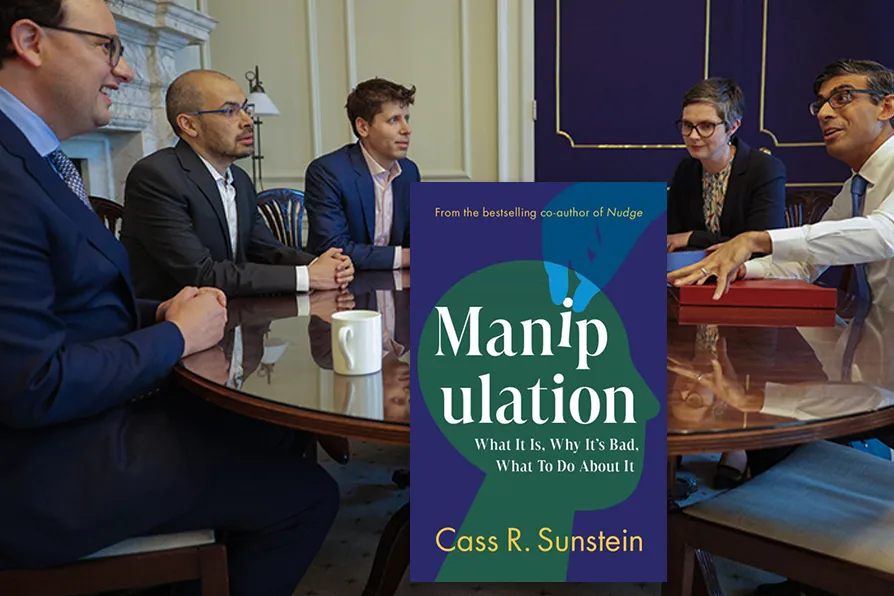RITA DI SANTO draws attention to a new film that features Ken Loach and Jeremy Corbyn, and their personal experience of media misrepresentation
Error message
An error occurred while searching, try again later.ALEX HALL is disappointed by a superficial investigation of how consumer choice can be influenced, that ignores the fact that most never have such a choice

 OUT OF TOUCH: The then Prime Minister Rishi Sunak meets with Demis Hassabis, CEO DeepMind, Dario Amodei, CEO Anthropic, and Sam Altman, CEO OpenAI, in 10 Downing Street. May 2023 [Pic: UK Prime Minister/CC]
OUT OF TOUCH: The then Prime Minister Rishi Sunak meets with Demis Hassabis, CEO DeepMind, Dario Amodei, CEO Anthropic, and Sam Altman, CEO OpenAI, in 10 Downing Street. May 2023 [Pic: UK Prime Minister/CC]
Manipulation: What it is, Why it is Bad, What to do About it
Cass R Sunstein, Cambridge University Press, £22
CASS R SUNSTEIN is a fully paid-up member of the committee for organising the affairs of the bourgeoisie. With an academic background that includes Harvard Law School and the University of Chicago, stints in the Obama administration, and a long pedigree in writing on US law and behavioural economics, he is an archetype of the sort of intellectual whose ideas get influence.
He is probably best known for Nudge, written with Rober Thaler. This latter work spawned various “nudge units” in various governments, including Britain (but now entirely privatised). The idea behind nudge units was to influence behaviour and decision-making though modifying the way that people made choices. The goal was compliance with public policy goals.
This book, Manipulation, leans heavily on nudge theory and tries to draw some hard lines between various ways of changing “choice architecture.” Manipulation is bad, as the full title indicates. However, the book entirely focuses on economic decision-making and this sees manipulation as something which interferes in the operation of the free market. As such a large chunk of it takes exception to the way that some websites channel users towards spending money.
However, no final definition of manipulation emerges from the introductory chapters in which it is differentiated from deception and coercion. Some characteristics include invoking emotional responses from the target to push towards certain less-than-optimum decision pathways. Clearly manipulation is very much related to deception and coercion, but the former two are easier to identify and regulate. Manipulation relies on adding or removing factors and consequences (often emotions) to choices.
Throughout the book, the author relies on telling us what ChatGPT says about the matter, which comes across as quite lazy for someone considered to be at the cutting edge of academe. Surely, he should writing the input for ChatGPT rather than just accepting the output?
However, the book is further limited by examining manipulation only within the confines of how markets operate from the position of the consumer. People can be manipulated to make purchases that are less than optimum through modifying choice pathways, which are often hard-coded into, say, purchasing platforms, subscription models and laborious cancellation pathways. As such, and it is easy to agree with, manipulation should be regulated against.
This is an extremely limited approach. Even a cursory examination of manipulation in capitalist societies would reveal it to be almost a ubiquitous feature of advertising and marketing, its use as a tool in lobbying, and also as a key feature in the promotion of propaganda. How many of us have not noticed manipulation taking place in front of our eyes over the last few years?
Further, when it comes to “choice architectures,” wondering which electric vehicle might be best to purchase while insisting on the right not to be manipulated, is only going to be something the particularly well off can be worrying about. For many, “choice architecture” is no choice at all. Rent, bills, food and work are all marked by compulsion rather than manipulation, all of which severely limit how most people operate in so-called free markets.
A bit of a fret about the icing, while ignoring that most people don’t even have cake.










